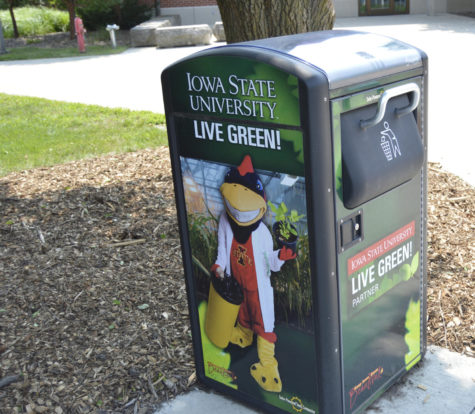ISU receives grant to produce bio-based adhesives.
Caitlin Ellingson/Iowa State Daily
A $1 million grant has been awarded to ISU by the United States Department of Agriculture to fund research on bio-based adhesives. These products would be free of bio-organic compounds, which are found in traditional adhesives and can be harmful to the environment.
December 16, 2014
Iowa State University has received a $1 million grant from the United States Department of Agriculture to begin development on bio-based adhesives.
The grant, received in August, will fund the project for three years. Currently, a pilot plant is being built at BioCentury Research Farm, part of the Center for Crop Utilization Research. The plant will produce multiple types of feedstock, including those used to produce bio-based adhesives.
“We have a pilot plant going up out there [BioCentury Research Farm] to develop some of the feed stock we are working with, primarily acrylated glycerin,” said David Grewell, professor of agriculture and biosystems engineering.
Glycerin is a co-product of biodiesel production from animal fats or soybean oil.
Iowa State is focusing on three different types of adhesives, Grewell said: construction adhesives, rubber cements and pressure-sensitive adhesives.
“When you say bio, there is all kinds of good things that come out of that, being renewable, being green. In particular though, these [adhesives] are VOC [volatile organic compounds] free,” Grewell said.
VOCs are gases released into the environment, that can be potentially hazardous to people and the environment. Traditional adhesives have VOCs. Grewell says that making the adhesives VOC free will help reduce the environmental hazards caused by traditional adhesives.
“Just because something is bio-based doesn’t mean that it has a better or smaller impact on the environment,” Grewell said. “Being biobased may be good, but does not assure that it will be a good thing and only through life cycle assessments, which is part of the project can this be assured.”
Grewell said the new adhesives should perform at least as well as traditional adhesives.
“If we’re going to be competitive, [the adhesives] need to match up in terms of performance, in terms of cost, one-to-one drop-ins compared to petrochemical materials,” Grewell said.
Iowa State has teamed up with 3M, Siegwerk and Seneca petroleum.
The grant is only a quarter of the money that the USDA has provided for research projects to expand the biofuel and bioenergy industry. U.S. Secretary of Agriculture Tom Vilsack calls the grants critically important.
A total of 220 grants were awarded.









